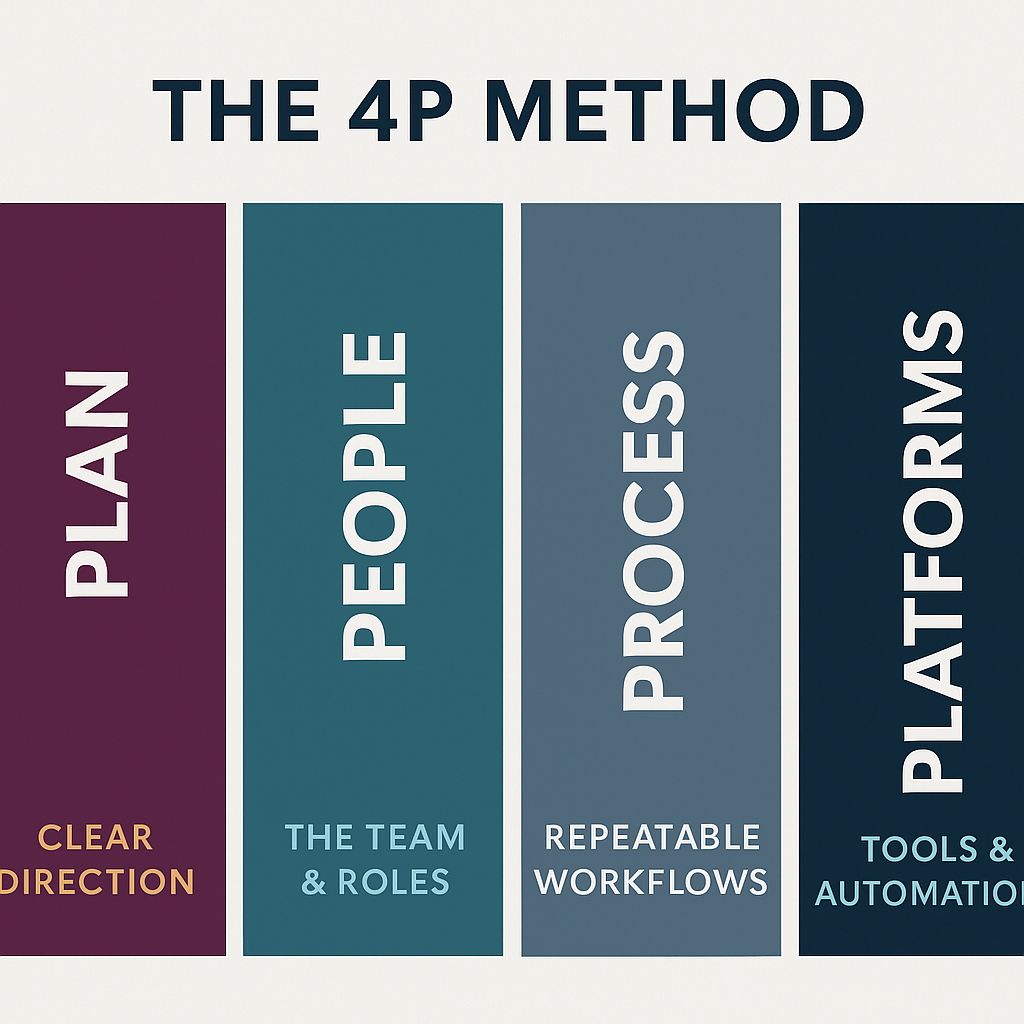If you’re a service-based business owner who’s tried hiring help, setting up systems, and using all the right tools—but it still feels like your business is held together with duct tape—this post is for you.
You’re not doing anything wrong.
You’re just running into something most entrepreneurs aren’t taught to look for…
a lack of true operations management.
And no, you don’t need to be Amazon to care about this.
You need to be a business owner who’s tired of running everything yourself and ready to scale with more ease, clarity, and consistency.
Let’s break it down.
What Is Operations Management (When You’re Not a Big Corporation)?
Forget warehouses and org charts.
In a small business, operations management simply means:
How work gets done behind the scenes—in a way that’s smooth, repeatable, and not dependent on you doing everything.
When operations are dialed in, your business can run without you being the glue holding it all together.
When they’re not, you feel it in every corner:
- Things fall through the cracks
- You’re constantly answering questions
- You’ve hired help, but it still feels messy
- You’re in delivery, admin, fire-fighting—all at once
If that’s your reality, your operations aren’t broken because you’re bad at business.
They’re just undefined, undocumented, and duct-taped together.
The Four Core Areas of Operations (That Most Business Owners Miss)
In my work as an Online Business Manager and systems strategist, I help service providers clean up their operations using what I call the 4P Method:
Plan – Clear direction, priorities, and capacity
People – The team and roles behind the scenes
Process – The repeatable workflows that power delivery
Platforms – The tools and automations that support it all

You can think of this as your operational foundation.
Without it, even the best VA or fancy project management tool won’t solve the chaos.
Signs Your Operations Are Slowing You Down
If you’re wondering whether your operations need work, here are some common red flags:
- You’re the decision-maker for everything
- Tasks get done, but only after you remind someone (again)
- Tools feel overwhelming—or go unused
- Your delivery process isn’t consistent across clients
- You’re repeating yourself, redoing work, or making up steps as you go
If more than two of these feel familiar, your operations likely need some love.
Why Hiring a VA or PM Isn’t a Magic Fix
This is where most people get stuck.
You hire a VA thinking they’ll take things off your plate—but you’re still the one giving direction.
You bring on a project manager, but you’re still the one organizing the chaos.
Here’s why:
Hiring help without a foundation of operations is like asking someone to build a house without blueprints.
Support roles are important—but operations are the system that support them.
What Happens When You Actually Fix Your Operations?
This part is magic.
When your business has strong operational systems, you get:
- More consistency
- Less time putting out fires
- Confident, proactive team members
- Repeatable delivery that doesn’t rely on your brain
- The ability to unplug or scale without burning out
Imagine knowing your clients are being onboarded beautifully, your team knows what to do without asking, and your tech is running smoothly in the background.
That’s what solid ops do.
No, You Don’t Have to Burn It All Down to Fix This
Here’s the part I want you to hear loud and clear:
You don’t need to rebuild your business from scratch to have clean operations.
Most of my clients are running successful businesses when they come to me—they’re just overwhelmed by messy systems, too much in their heads, and team members who are waiting on them.
What we do instead is layer in operations, using the 4Ps, inside what’s already working.
You can evolve your systems without pausing your business.
Your First Step? Let’s Find Your Gaps.
You don’t need a 6-month overhaul or another tool.
You need someone to help you diagnose where your operational friction lives—and what to fix first.
That’s where I come in.
If you’re ready to stop duct-taping things together and start building a business that can run smoother (without burning you out)…
Apply to work with me using the form below.
We’ll take a look at your current systems, identify the biggest opportunities for relief, and map out a clear first step to simplify and scale.
You started your business for freedom, not to become the world’s most stressed-out project manager.
Operations management isn’t a corporate buzzword.
It’s the key to running a business that doesn’t run you into the ground.
Let’s make your business feel like it’s working for you again.



